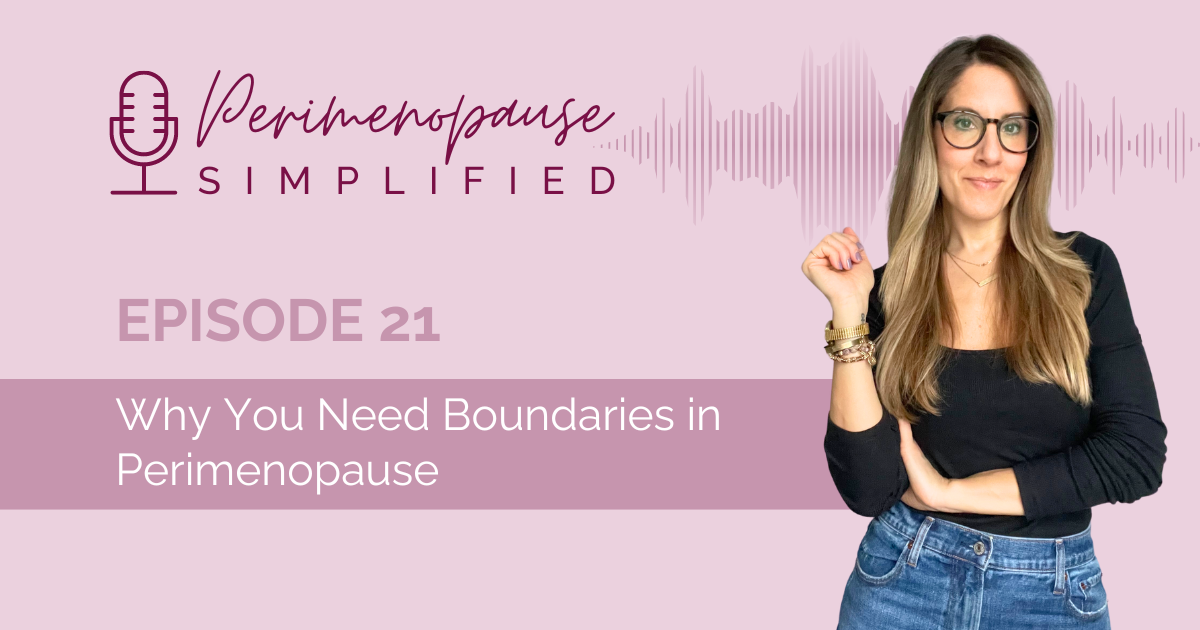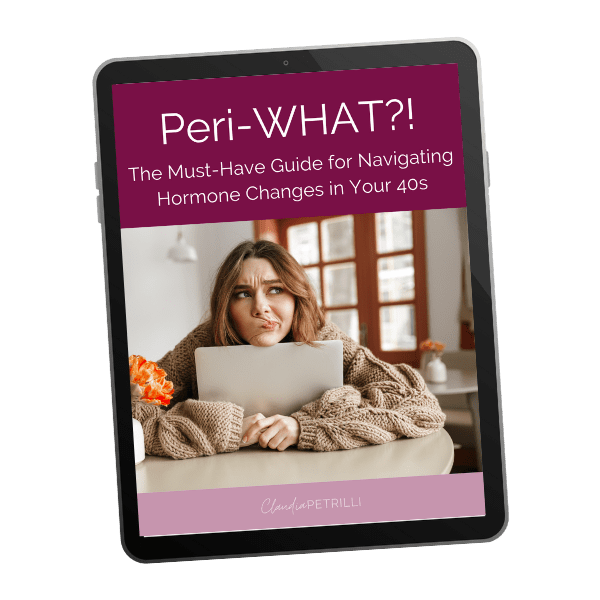
21. Why You Need Boundaries in Perimenopause
Don’t Miss An Episode!
In this episode, we covered:
- What are boundaries?
- Why we need boundaries in perimenopause
- Examples of leaky boundaries
- The formula for loving boundaries
- Energy leaks you may not be aware you have
- Why you might have leaky boundaries
- How to start putting boundaries into place
Understanding Boundaries
You’ve likely heard the term “boundaries” but maybe you’re not clear on what it means or how to go about setting them. So let’s dive in.
The Importance of Boundaries During Perimenopause
I believe as we navigate perimenopause, it’s vital to assess who and what we give our energy to, to be more selective, and in order to do that, we need to create boundaries. That could be boundaries with friends, family members, colleagues, clients, kids, and even pets.
The Impact of Lacking Boundaries
We can easily blame our declining hormones for low energy, crappy sleep, moodiness, overwhelm, stress…but you’re also feeling this way because you probably lack healthy boundaries.
Common Issues with Boundaries in Women
We see this over and over with women who come to work with us – they’ve spent most of their lives over giving, over delivering, over working, saying “yes” to everyone and everything else, wanting to control things (talking to you my type A ladies) – all while neglecting themselves in the process, and as a result, their health declines.
And listen, I have been there myself. This is something I have worked on for years and I am STILL working on. I’ve had to reassess several relationships over the years.
What Exactly is a Boundary?
So what exactly is a boundary? I think of a boundary as an invisible line that you create that should not be crossed. When it comes to relationships specifically, a boundary defines where our responsibility and control for another person begins and ends (let me say that again).
Recognizing Leaky Boundaries
When someone has “leaky boundaries”, it means they don’t stick to this “line”, they bend easily, believe they are responsible for another person, try to control someone else, worry about things that are not theirs to worry about, try to fix other people’s problems, and often feel resentment towards another person.
The Danger of Rigid Boundaries
And someone who has leaky boundaries may come to the realization at some point that they need to create “firm boundaries”. But what often ends up happening is they create boundaries that are so rigid, that it can be quite jarring for the person on the receiving end. This can leave a person feeling dismissed or even abandoned.
Creating Loving Boundaries
While another person’s reaction isn’t your responsibility, I do believe it’s important to create loving boundaries, effectively communicating your needs, and what you will/won’t stand for.
The Secret to Effective Boundaries
We can create loving boundaries with another human — without being mean, harsh or resulting in them feeling isolated.
But the secret is: respectful communication, with a side of compassion. And by communication, I mean being clear on what you need, but also LISTENING.
The Importance of Listening
Listening has become a lost art in relationships. So many of us are disconnected and think about what we want to say next, instead of truly listening to the other person.
Connecting Through Listening
When we listen (as in looking the person in the eyes when they speak, not distracted), we are able to connect on such an intimate level and tend to be more compassionate. It makes a person feel seen, heard and understood.
Assessing Your Time and Energy
All that said, it’s important to take a step back and assess where and how you spend YOUR time and energy.
Examples of Leaky Boundaries
You may not even realize how often you’re giving to others, while putting your own needs on the backburner. It’s actually not fair to other people when you don’t create boundaries, because when you overgive and someone doesn’t appreciate it, you become resentful, angry and feel under appreciated. But whose fault is that? So let’s talk about some examples of leaky boundaries:
Group Texts
Being part of and answering group texts – I’ve had to remove myself from many; I do not believe we need to be in constant communication with others and if someone needs me, they can reach out directly or if there’s an emergency, they can call 911; I invite you to assess how many group chats you’re in and do they add value to your life or stress?
Immediate Email Responses
Replying to emails as soon as they land in your inbox – try to prioritize what’s important to respond to; unsubscribe to emails that don’t support your health or wellbeing
Overworking
Not knowing when to shut down after a work day and being available 24/7 to your coworkers or boss, instead of having a clear work schedule and “shutting down” at the end of the work day
Social Obligations
Attending every event you’re invited to – versus overbooking yourself; we get invited to a lot of events and we simply cannot attend them all. I used to feel guilt over this, but now I give myself grace; my intention is never to hurt anyone’s feelings, but I cannot split myself in a million directions as a business owner and someone who is also navigate perimenopause; there are days I just want to be alone – I’m not always in the mood to socialize and I’m OK with that
Reasons for Leaky Boundaries
So why might you have leaky boundaries?
- Need for Control – wanting to control others or situations
- Fear of Disappointing Others – wanting people to like or love you
- Lack of Modeling – you grew up with parents/family who didn’t have healthy boundaries
- People Pleaser – you want to make everyone happy, never ‘rock the boat’
- Low Self-Esteem – and don’t think your needs are important
How to Start Setting Boundaries
So how can you start putting some boundaries in place?
- Remove yourself from group texts if they take up a lot of time
- Dedicate a certain time of day to check emails/texts
- Shut off notifications on your phone so you’re not being dinged all day long
- Create a work schedule and stick to it; this is especially important for business owners
- Start saying no to events or requests of your time when it doesn’t feel good to say yes
- Encourage others to find solutions to their problems, vs. trying to solve it for them; an old mentor used to tell me “let people have 1 rant or swirl, then say to them – “what are you gonna do about it?”
- Set expectations with others; I had a client years ago who told me she was always so frazzled in the morning, getting her kids ready for school and her mom would call her around that time, so I told her to kindly say to her mom “mom, I love talking to you, but in the morning I’m busy with the kids, so can we pick another time to chat each day?” and it really helped her to improve their relationship
- Believe that saying ‘no’ doesn’t require an explanation
Recognizing Non-Negotiables
Look, the reality is: there are plenty of things in life that we cannot say “no” to, like working, paying your bills, caring for your children, or in my case, a needy dog, and aging parents. So look at other energy leaks – really take a step back and assess how you spend your time. I recently had to step away from a form of communication that wasn’t serving me and the friendship was affected. It’s unfortunate, but had to be done for my mental health.
The Importance of Boundaries for Health
Quite frankly: boundaries are a critical part of maintaining your mental, physical, and overall health.
Alright, I hope that was helpful to you and gave you some food for thought. Think about who and what drains your energy and reflect on how your lack of boundaries may be playing a role. See you next week 😉
Claudia Petrilli is a Functional Health Coach, Integrative Nutrition Coach, Women’s Health Educator, and creator of The Hormone Rescue program. Having experienced debilitating periods, digestive issues, a sluggish thyroid, a pituitary tumor, and perimenopause symptoms in her late 30s, she knows exactly what it’s like to get dismissed by doctors and spend years searching for answers.
To connect with Claudia Petrilli:
FREE GIFT: Peri-What?! The Must-Have Guide for Navigating Hormone Changes in Your 40s
WORK WITH US: The Hormone Rescue Program
QUESTIONS? EMAIL: claudia@claudiapetrilli.com
LOVE THE SHOW?! Please subscribe, leave a 5-star rating, review, and share, so that other women can find this podcast for guidance and support through their perimenopause journey!






